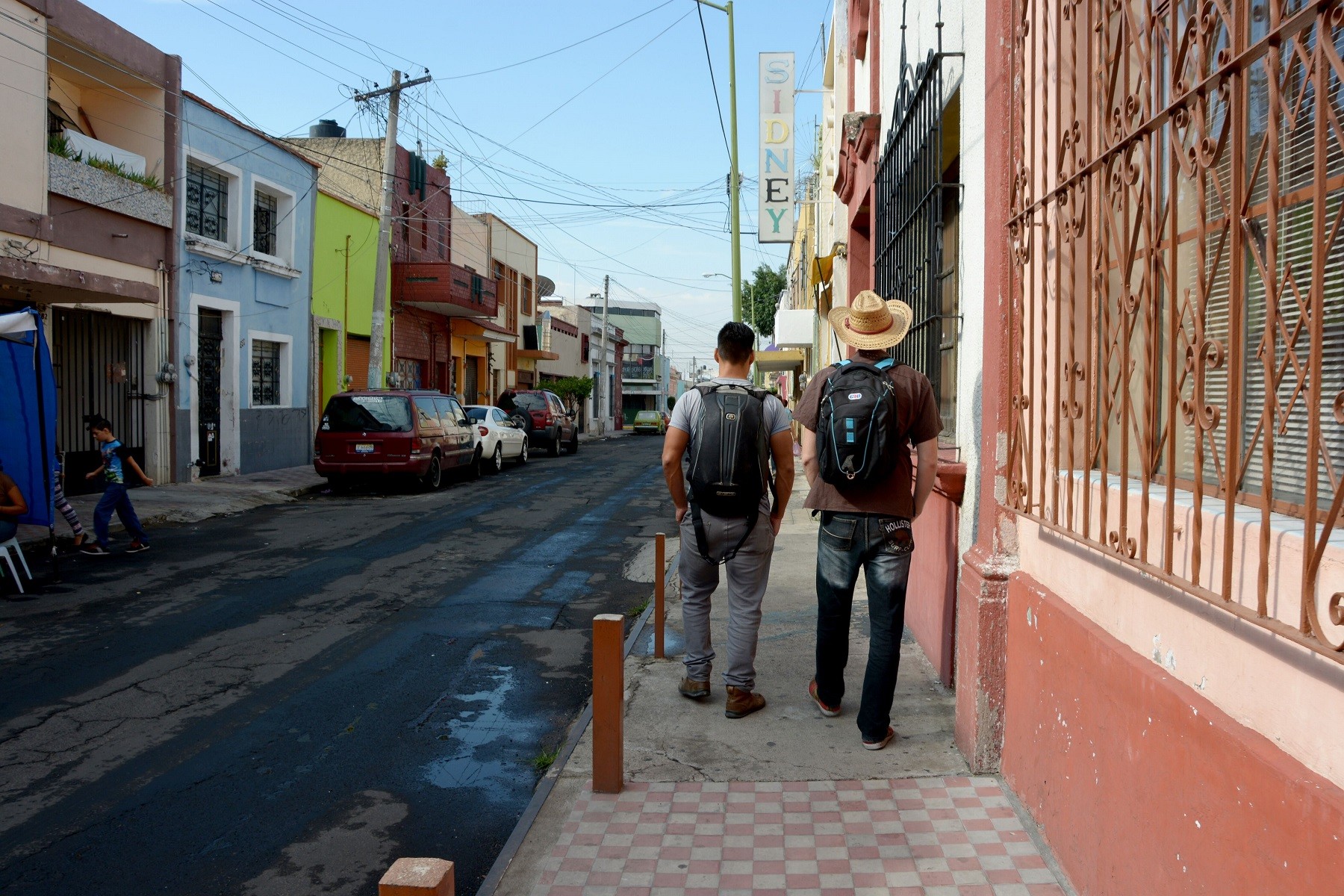Authority is not law. Reason and empathy are Law. Read more →



Authority is not law. Reason and empathy are Law. Read more →

Kurt is processed by the immigration authorities in Mexico Read more →
To download the audio, right click and press “save as”.
There is a principle of law that is acknowledged and often enforced all around the world, that if someone interferes with another’s person or property, they will be punished. For example, if you break down someone’s door without a damned good reason, such as the prevention of harm to an innocent, if you are caught and proven guilty, you will be punished. Likewise, if I approach someone and threaten them into giving me money, if I am caught, I will be punished. Of course, if it is found that I was in a very desperate situation such as having to feed my family, this will be treated as mitigating circumstances and the sentence will be reduced. However, I will still be punished.
Given the choice, would you prefer to live in a society where everyone who broke down doors without a very good reason were punished, and everyone who threatened others into giving them money were punished? Or would you prefer to live in a society where certain classes of people had an exemption, where they could break down doors indiscriminately, without good reason, and threaten people into giving them money without being punished at all?
If a person doesn’t give the question its full consideration, most people will say, of course they would prefer to live in a society where the law is applied evenly. But what is the full extent of this proposition?
Police, having no right to arrest anybody whom they didn’t reasonably suspect of harming someone or their property, will decide to keep mostly to themselves, or find productive ways of maintaining the peace, by establishing ties with the community and gaining its trust. Instead of demanding someone pull over for driving too fast, they would calmly and politely ask, and attempt to persuade them that their actions exposed themselves and others to undue risk.
Judges, knowing that they will be liable for any command they make, will be unwilling to enact any punishment against peaceful people, for example, for buying or selling drugs.
Politicians would be scared to pass any legislation punishing anyone who hadn’t harmed another – making the job of politician almost completely unnecessary. And they certainly wouldn’t call for acts of war which endangered the lives of innocent civilians, because every innocent killed could be a charge of manslaughter. Likewise, soldiers would refuse to attack unless they could be certain they were only attacking a legitimate threat.
Tax collectors would decide to change tactics, knowing they couldn’t threaten anybody into getting their money, and so they would instead canvas for donations, or turn to charging for individual services.
If you agree with the premise that those who injure, threaten or steal from others should be punished, you might have to rethink what the problems with the world are, and what your idea of an ideal world might be. If you disagree, and believe that certain classes of people should be free to attack, threaten and steal from others, and even commit mass murder, then again I would suggest you reconsider where your ideas might lead, what kind of ideal world they imply, and whether that is really the kind of thing you want to support, in your heart or in your actions. Do you really want to be a detractor of civilisation, welcoming violence as necessary, along with all of the abuses of power that come with it?
Making a more peaceful world isn’t easy. There will be challenges along the way, inventing new ways of solving problems with less and less violence, or no violence, when previously we believed they were only solvable with violence. And maybe we’ll never achieve such a thing in our lifetimes, or in any lifetime. But when you look back on your life, with your dying breath, will you be content in knowing that your entire life you supported the status quo, that violence is a requirement? Or would you be more content knowing that you dared to dream, to imagine a world without war, without police brutality and abuses of power, where the word “civilisation” is not a euphemism for a society dominated by the threat of violence, but, through an entire population becoming civil, is a literal fact.
I’m not asking much. I’m not asking you to do or say anything, or even exert any effort. I’m just asking you to let go of one idea, the idea that “violence is necessary” – the conviction that even an ideal world must include threats of violence – because whatever happens, the thought of dominating your fellow man out of necessity can never make you happy. To liberate yourself from this idea is to open up new possibilities, to open yourself to compassion for your fellow man, and to embrace the innocent as worthy of your protection.
To download the audio, right click and press “save as”.
Remember to subscribe on iTunes or subscribe on Pocket Casts.
If you enjoyed the episode, don’t keep it a secret! Feel free to share it on Twitter, Tumblr, Facebook, Reddit, or your office bathroom wall.
We really appreciate all of your contributions! Every cent and satoshi we receive lets us know that we’re doing something worthwhile, that you are entertained by our program, and that you’re starting to question what you know more and more. Please be generous. Donate to The Paradise Paradox. Or buy some stuff on Amazon using this link.
The simplest argument against gun control is an argument for justice, an argument that a person who has harmed no-one should not be punished. If you accept as a premise the maxim of law that the burden of proof falls on him who claims, not on him who denies, then likewise you will accept the principle of the presumption of innocence, because in the absence of evidence of guilt, one must be assumed to be innocent. Then, if you accept the premise that innocent people should not be punished, then you must draw the conclusion that gun-owners, weapons manufacturers and retailers should not be punished unless there is evidence of their guilt. That means there should be no violence or threats of violence against them, no fines imposed, no restrictions on their liberties, and certainly no imprisonment, unless there is evidence of wrong-doing.
If you formulate a law that says everyone who owns a certain model of firearm should be arrested, then you have made a declaration contrary to justice, for even if a single person possesses that model and only ever uses it responsibly, you have declared that that innocent person should be punished. You might make the argument that, even an excellent court system is not going to be absolutely correct, 100% of the time, and that doesn’t make it a bad court, and likewise, the failure of this law does not make it a bad law. I agree no court system is perfect, however, that is a failure of implementation, not a failure of principle. If a court is good, then the intent of the court was to provide justice, whether they do or not in any individual case. However, the intent of this hypothetical law, and all gun control laws, is to punish people – whether or not they’re guilty, and there is no way that it can ever improve the state of justice.
In this episode, Kurt explores some of the ideas about gun control, why some people think control of firearms is a good idea, and why they are very wrong. Join us in a transcendental journey to freedom, in the next explosive, on-point, hollowpoint episode of … The Paradise Paradox!
The Most Dangerous Superstition
How to Be a Successful Tyrant (The Megalomaniac Manifesto)
To download the audio, right click and press “save as”.
Remember to subscribe on iTunes or subscribe on Pocket Casts.
If you enjoyed the episode, don’t keep it a secret! Feel free to share it on Twitter, Tumblr, Facebook, Reddit, or your office bathroom wall.
We really appreciate all of your contributions! Every cent and satoshi we receive lets us know that we’re doing something worthwhile, that you are entertained by our program, and that you’re starting to question what you know more and more. Please be generous. Donate to The Paradise Paradox. Or buy some stuff on Amazon using this link.
Walking or driving through your own city, you may have lived there for years, but it’s possible that your city holds secrets which you have no awareness of. Turn down the wrong street one day, and find yourself in some place exciting, or dangerous. Everything looks familiar, but everything looks a little strange. What mysteries are waiting for you, hiding within your own city, tucked away behind a facade, obscured from view by just the right wall or hill?
In th is episode we recount the tale of how we came to know the secret forest of Guadalajara, Colomos III, a garden of pedagogy maintained and improved by a horizontal organisation of volunteers, putting in all their effort to keep a slice of paradise tucked away in the city, winning the community’s attention and warding off the corrupt government, which is constantly trying to unjustly acquire and sell off the forest to cunning property developers.
What medicinal herbs can you find there? What is the value of the forest that the people living around it don’t yet understand? Who are those strange men who set up makeshift temples there after midnight? We ask all these questions and more, on the next thrilling chapter of … the Paradise Paradox!
The Homestead principle on Wikipedia
The Advantages of Horizontal Structures
Adverse possession on Wikipedia